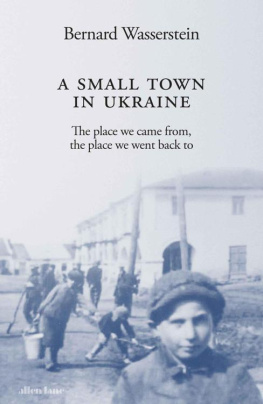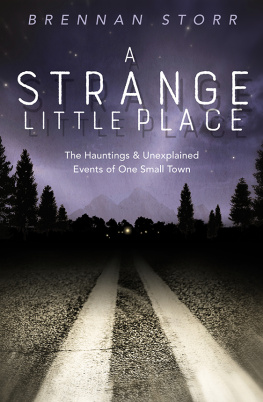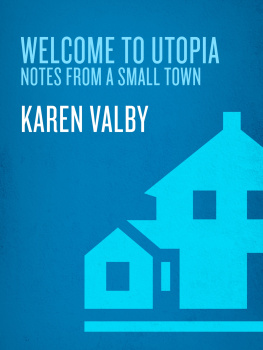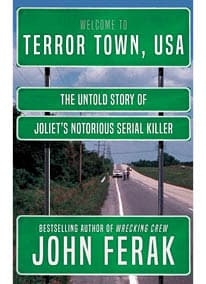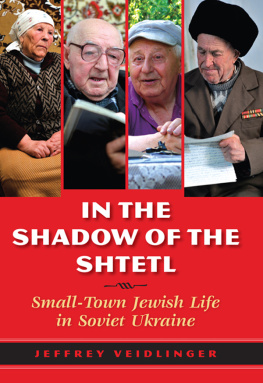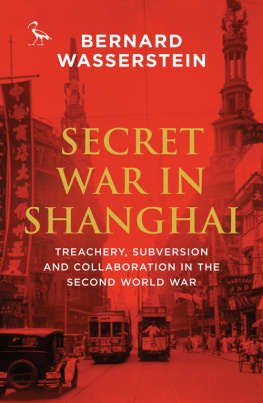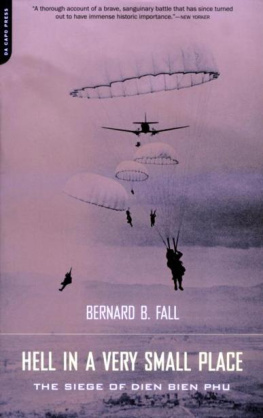Bernard Wasserstein - A Small Town in Ukraine: The place we came from, the place we went back to
Here you can read online Bernard Wasserstein - A Small Town in Ukraine: The place we came from, the place we went back to full text of the book (entire story) in english for free. Download pdf and epub, get meaning, cover and reviews about this ebook. year: 2023, publisher: Penguin Books Ltd, genre: Non-fiction. Description of the work, (preface) as well as reviews are available. Best literature library LitArk.com created for fans of good reading and offers a wide selection of genres:
Romance novel
Science fiction
Adventure
Detective
Science
History
Home and family
Prose
Art
Politics
Computer
Non-fiction
Religion
Business
Children
Humor
Choose a favorite category and find really read worthwhile books. Enjoy immersion in the world of imagination, feel the emotions of the characters or learn something new for yourself, make an fascinating discovery.
- Book:A Small Town in Ukraine: The place we came from, the place we went back to
- Author:
- Publisher:Penguin Books Ltd
- Genre:
- Year:2023
- Rating:3 / 5
- Favourites:Add to favourites
- Your mark:
- 60
- 1
- 2
- 3
- 4
- 5
A Small Town in Ukraine: The place we came from, the place we went back to: summary, description and annotation
We offer to read an annotation, description, summary or preface (depends on what the author of the book "A Small Town in Ukraine: The place we came from, the place we went back to" wrote himself). If you haven't found the necessary information about the book — write in the comments, we will try to find it.
A Small Town in Ukraine: The place we came from, the place we went back to — read online for free the complete book (whole text) full work
Below is the text of the book, divided by pages. System saving the place of the last page read, allows you to conveniently read the book "A Small Town in Ukraine: The place we came from, the place we went back to" online for free, without having to search again every time where you left off. Put a bookmark, and you can go to the page where you finished reading at any time.
Font size:
Interval:
Bookmark:

About the Author
Bernard Wasserstein is Emeritus Professor of History at the University of Chicago and a corresponding Fellow of the British Academy. Born in London, he now lives in Amsterdam. His previous books include The Secret Lives of Trebitsch Lincoln (CWA Gold Dagger Prize for Non-fiction), On the Eve: The Jews of Europe Before the Second World War (Yad Vashem International Book Prize), and Barbarism and Civilization: A History of Europe in Our Time .
Bernard Wasserstein
A SMALL TOWN IN UKRAINE
The place we came from,
the place we went back to

Contents
For Charlotte and TomerPreface
Krakowiec ( Krah-KOV-yets ) the place we came from, the place we went back to. I first heard of it from my mother in the mid-1950s when I was about nine years old. She told me Krakowiec was the town in Poland from which my fathers family hailed.
Actually, the name rang a curious bell in my childhood memory. Two or three years earlier, a visitor from the past had come to our home. His name was Majus. No doubt he had a forename but my father, if he mentioned him at all, always referred to him tout court by his surname, without Mr or any other handle. I had the impression he did not welcome his arrival.
Majus (his forename, I later learned, was Pinkas, or more familiarly Pincze) was one of the few Jews from Krakowiec who had survived the Second World War. He talked with my father about his experiences. Then and later, I asked what he had said but for a long time my father would not reply. Perhaps he wanted to shield a child from dark shadows. Or maybe the reason was that he didnt altogether approve of Majus (who was later found guilty of operating an illegal still for the production of moonshine in the basement of his house in London). At any event, I discovered nothing of what our visitor related. I had to make do with the puppet glove monkey that he gave me, a creature whose inside felt warm and soft but whose exterior glared at me with a menacing grimace.
My mother had never been to Krakowiec and knew very little of the place. What with her relative ignorance and my fathers stern reticence, I grew up knowing almost nothing about it. Yet throughout my youth I dreamt of this almost unmentionable, and therefore all the more mysterious, almost mythic, ancestral hearth.
Where exactly was Krakowiec? It was so small that it did not rate an appearance in our home atlas. Even when, years later, I consulted the largest-scale maps available, the answer was unclear, since it appeared to be smack on the border between Poland and the Soviet Union.
Suddenly, in 1989, the Iron Curtain was raised. With the disintegration of the Soviet Union two years later, Krakowiec emerged, as from a cloud, just inside the newly independent republic of Ukraine. Not long afterwards, in the company of my brother, I visited the town for the first time. It was an eerie, eye-opening experience, described later in this book, that insinuated into my mind a compulsive ambition: I would compensate for a lifetime of unrelieved curiosity about our origins by finding out everything that could be ascertained about Krakowiec and its connections with my family.
Pardonable genealogical curiosity burgeoned into an obsession. I spent the next three decades digging ever deeper into what turned out to be an immense historical quarry. I visited archives and libraries on several continents, consulted experts and struggled to acquire new languages. I had spent my life as a professional historian but now I penetrated further into the past than I had ever previously ventured. In the course of my research I built up vast data banks of official records, newspaper dispatches, census materials, registers of births, marriages and deaths, electoral results, medical reports, maps and photographs, as well as meteorological, geological, ecological, ornithological, architectural, judicial, military, ecclesiastical and every other category of information I could find. Soon I had assembled a veritable encyclopaedia of statistics and documentation, illuminating every aspect of a place that had once seemed unknowable. But all that was just the beginning.
Like the inhuman pedant Edward Casaubon in George Eliots Middlemarch , with his project for the key to all mythologies, I conceived a crazily impossible aspiration: I would assemble a biographical dictionary of every single person in recorded history who had ever lived in Krakowiec. This would be no telephone directory but the life story of each inhabitant, a kind of Namierite super-prosopography. Sir Lewis Namier was the Polish-born English historian whose monumental History of Parliament , continued after his death, contains lives of MPs (21,420 so far ) and surveys of their constituencies (2,831 so far ). More than sixty years after his death, the publication has reached only the year 1832. Namiers name will reappear in the story I have to tell.
Of course, my enterprise, like Casaubons and Namiers, could never be completed. Yet driven by some inner need, I pursued it until it now encompasses entries for over seventeen thousand persons. At its peak, Krakowiec had a population of around two thousand. What I accumulated was thus an appreciable proportion of the total number of residents over the past six centuries. This Whos Who of Krakowiec includes Poles, Jews, Ukrainians, Germans, Russians, an Armenian (though I dont know his name), a French landscape designer and an infant girl born out of wedlock, the daughter of a Hungarian soldier garrisoned in the town. Some of my entries are merely half-faded names carved on tombstones in Latin, Cyrillic or Hebrew letters. Others are life histories that can be reconstructed in minute detail. Among them are serfs, aristocrats, craftsmen, merchants, rabbis, Christian clerics of the Roman and Greek Catholic rites, an eighteenth-century music-master, a nineteenth-century lady of leisure and a twentieth-century mass murderer revered today as a national hero. Most were humble folk but there were also a few prominent persons whose names and deeds reverberate down to our time. All these ghost-like figures, by dint of a gradual accretion of evidence, slowly acquired something close to flesh and blood, at any rate in my mind, so that I felt I had come to know and form indissoluble bonds with many of the people of the town.
No doubt to the relief of my readers, I have consigned the greater part of this heap of data to the dark side of my electronic retrieval system. In what follows there remains only alluvial sediment, historical gold dust relevant to my narrative. Out of the thousands of individuals I have come to know, sometimes as if they were intimates, just a handful are briefly recalled to life here as actors or witnesses.
In this autobiography of the period before I was born, I tell the story of Krakowiec, more particularly that of the Jews of this typical east European shtetl (small town), and most of all that of my family and our relationship with the place. By peering through this keyhole, I want to observe and understand how some of the great forces that determined the history of our time could affect ordinary people.
A central character in this narrative bears my name, though he is not me. I never met my grandfather Bernhard (known as Berl) Wasserstein, so this book is in part an account of my search for him and for those fragments of him that I find in myself.
In the course of my scholarly training, I was taught to eschew the first person in writing, to strain for impersonal objectivity and to address the past, sine ira et studio , as from an Olympian height. But such constraints collapsed as I investigated the history of my own family and explored its twists and turns. Above all, I wanted to understand how they we I reacted to those events, always in our own way.
Next pageFont size:
Interval:
Bookmark:
Similar books «A Small Town in Ukraine: The place we came from, the place we went back to»
Look at similar books to A Small Town in Ukraine: The place we came from, the place we went back to. We have selected literature similar in name and meaning in the hope of providing readers with more options to find new, interesting, not yet read works.
Discussion, reviews of the book A Small Town in Ukraine: The place we came from, the place we went back to and just readers' own opinions. Leave your comments, write what you think about the work, its meaning or the main characters. Specify what exactly you liked and what you didn't like, and why you think so.

